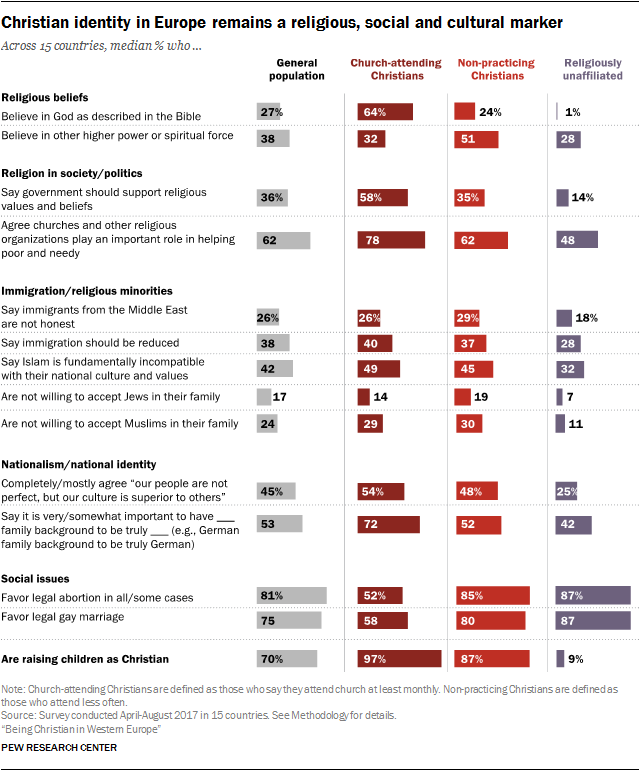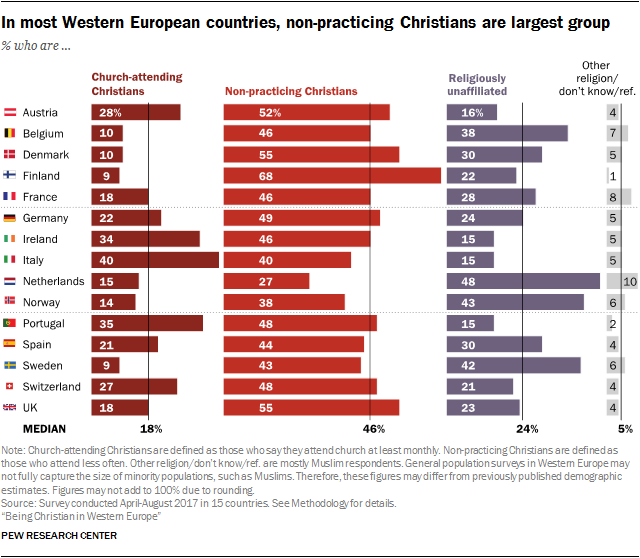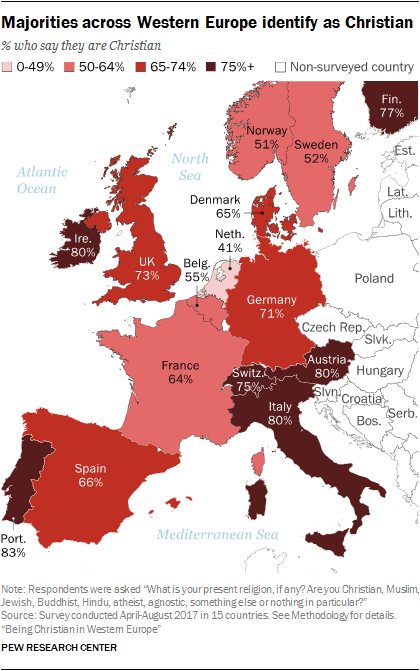Views on relationship between government and religion
Results of the Pew research Center survey:
Generally speaking, Western Europeans do
not look favourably on entanglements between their governments and
religion. Indeed, the predominant view in all 15 countries surveyed is
that religion should be kept separate from government policies (median
of 60%), as opposed to the position that government policies should
support religious values and beliefs in their country (36%).
Non-practicing Christians tend to say
religion should be kept out of government policy. Still, substantial
minorities (median of 35%) of non-practicing Christians think the
government should support religious values and beliefs in their country –
and they are much more likely than religiously unaffiliated adults to
take this position. For example, in the United Kingdom, 40% of
non-practicing Christians say the government should support religious
values and beliefs, compared with 18% of “nones.”
In every country surveyed, church-attending Christians are much more
likely than non-practicing Christians to favour government support for
religious values. In Austria, for example, a majority (64%) of
churchgoing Christians take this position, compared with 38% of
non-practicing Christians.

The Pew survey also gauged views on religious
institutions, asking whether respondents agree with three positive
statements about churches and other religious organizations – that they
“protect and strengthen morality in society,” “bring people together and
strengthen community bonds,” and “play an important role in helping the
poor and needy.”
Three similar questions asked whether they agree with
negative assessments of religious institutions – that churches and other
religious organizations “are too involved with politics,” “focus too
much on rules,” and “are too concerned with money and power.”
Once again, there are marked differences
of opinion on these questions among Western Europeans across categories
of religious identity and practice. Throughout the region,
non-practicing Christians are more likely than religiously unaffiliated
adults to voice positive opinions of religious institutions. For
example, in Germany, a majority of non-practicing Christians (62%) agree
that churches and other religious organizations play an important role
in helping the poor and needy, compared with fewer than half (41%) of
“nones.”
Church-attending Christians hold
especially positive opinions about the role of religious organizations
in society. For example, nearly three-in-four churchgoing Christians in
Belgium (73%), Germany (73%) and Italy (74%) agree that churches and
other religious institutions play an important role in helping the poor
and needy. (For more analysis of results on these questions, see
Chapter 6.)

 In 1380, the Archbishop of Canterbury, Simon of Sudbury became Lord
Chancellor of England. It was an honor that cost him his life. Outraged
by a corrupt church, a failing war with France, and the hardship of
special taxes, England's peasants revolted. Under the leadership of men
like Wat Tyler, Jack Straw, and John Ball, they petitioned for the
abolition of serfdom, and the reform of tithes, game laws and use of the
forests. Above all they wanted the hated poll (head) tax abolished. Archbishop Sudbury had approved this crushing burden. The
Roman Church was at a low ebb of respect at the time, particularly
because of the great schism which had rival popes warring with one
another.
In 1380, the Archbishop of Canterbury, Simon of Sudbury became Lord
Chancellor of England. It was an honor that cost him his life. Outraged
by a corrupt church, a failing war with France, and the hardship of
special taxes, England's peasants revolted. Under the leadership of men
like Wat Tyler, Jack Straw, and John Ball, they petitioned for the
abolition of serfdom, and the reform of tithes, game laws and use of the
forests. Above all they wanted the hated poll (head) tax abolished. Archbishop Sudbury had approved this crushing burden. The
Roman Church was at a low ebb of respect at the time, particularly
because of the great schism which had rival popes warring with one
another.





